- Joined
- Jan 28, 2011
- Messages
- 99,504















Ooh, RPG mega-interview on the way?















The future of CRPGs
Three developers weigh in on the direction of the revitalised genre.
Fraser Brown31 minutes ago
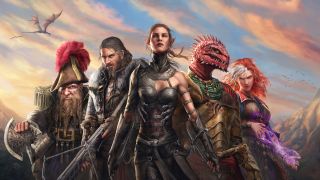
It wasn’t so long ago that the isometric CRPG seemed like an endangered species, consigned to annals of video game history, or at least the '90s when classic like Baldur's Gate were released. With the rise of crowdfunding and indie developers, however, the genre has returned in a tidal wave of spiritual successors and fantasy romps. So much of this resurgence is tangled up in nostalgia, though, begging the question: how does the genre move forward?
The friction between nostalgia and innovation is an obstacle inherent in any game trying to evoke the classics. In RPGs, it’s even more apparent because an overwhelming number of them are set in high fantasy universes full of elves, dwarves and handy magical swords. When an RPG does eschew the fantasy setting, it’s usually leans into science fiction.
“I don’t think RPGs are really shackled to sci-fi and fantasy, it’s just tradition,” says Josh Sawyer, most recently Pillars of Eternity 2: Deadfire’s game director. “I think a lot of it comes from the background of roleplaying games. Dungeons & Dragons started as Chainmail, which is really a fantasy wargame, and since then a lot of RPGs have been fantasy, trying to ape the experience of D&D.”
RPGs are great at simulating dice rolls and fights, reckons Sawyer, but social interactions and relationships are a taller order. “Heroic sci-fi and fantasy, and their dark counterparts, are easier to understand in a roleplaying context because RPGs are built around violent struggles, typically between a party of people and a faction or an evil overlord. It just works well there, and it’s harder to conceive of what an RPG is when you step out of that comfort zone.”
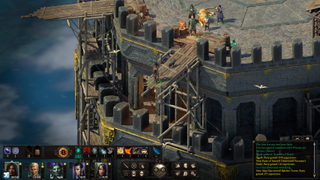
While Sawyer doesn’t think that people are hostile towards the idea of an RPG that doesn’t fit the traditional mould, he still feels like there are more reservations about RPGs with a modern setting, unless it’s a modern setting with supernatural elements. It’s one of the reasons the first Pillars of Eternity was set where it was.
Deadfire gets away from medieval castles and bucolic fantasy kingdoms, replacing them with pirates, tropical islands and an exploration of colonialism.
“With the first Pillars, I admit that I was being very conservative. So much of the company’s fate depended on its success. I was so concerned about making something that was too far away that I cleaved very tightly to traditional Western European, Forgotten Realms fantasy. But once Pillars did well, for Deadfire I said, ‘Let’s get out of here!’ We kept familiar elements, but we changed the scenery and societies you’re interacting with. It’s still fantasy, but a different kind of fantasy.”
Deadfire gets away from medieval castles and bucolic fantasy kingdoms, replacing them with pirates, tropical islands and an exploration of colonialism. It’s also a rare RPG where white people are in the minority. There’s this clear path from Baldur’s Gate to the first Pillars of Eternity, but Deadfire quickly takes off in a different direction, getting less and less like its progenitor as the game progresses.
Swen Vincke, Larian Studios’ CEO, sees Divinity: Original Sin and Original Sin 2 as steps in the evolution of RPGs, an evolution that will continue well into the future. That doesn’t mean, however, putting the fantasy tropes out to pasture.
“I don’t think that setting is necessarily that important, as long as it’s a setting that appeals to a large enough group of players and generates some initial interest. It’s what you do with a setting that’s important. It’s perfectly possible to come up with a brilliant fantasy game and do something that has never been done before. That’ll be the case forever, I think, and it’s the same for science fiction.”
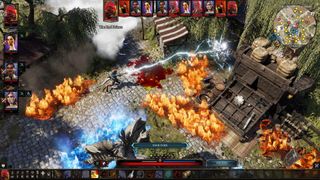
The sheer number of fantasy RPGs, even if they do tweak the formula, can make the genre seem homogeneous, but Vincke believes that a lot of the fantasy exhaustion is coming from the media. “I think the press doesn’t like fantasy, but our audience does,” he says. For reviewers, at least, the slog is definitely amplified when you’re working through more than the one or two RPGs a year most people have time to play, but everyone is just as capable of growing tired of the overly familiar.
For Vincke, there’s still limitless potential in fantasy, and Original Sin 2 certainly takes the genre to new and weird places, full of empathic, cannibal Elves and posh lizards. He doesn’t find fantasy restrictive, then, but that doesn’t stop him from thinking about spreading out.
“I have a couple of settings that I’d really like to explore, but I have to remind myself that there’s a big risk that, if I do, nobody’s ever going to want to play them because there’s only a small group that’s interested in the setting.”
So there are expectations. That a Divinity game is going to be a fantasy game, that an RPG has to have weapons, that everything, increasingly, needs to include crafting. Something being expected or traditional, however, doesn’t equate to good game design. If not meeting those expectations negatively impacts the player experience, says Vincke, that’s not good game design, either.
“When players come to a game like Original Sin 2, they come with a bunch of expectations. If you don’t match their expectations, it actually affects their enjoyment of the game. So you’re better off putting them in there, and you often notice that, when you do, the players find more enjoyment in the game. It doesn’t mean I necessarily like putting them in there.”
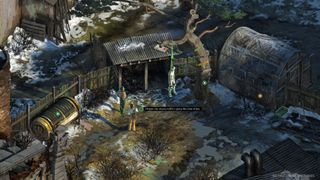
Robert Kurvitz, Disco Elysium’s lead designer, is betting on people being willing to plunge into an unconventional RPG. It’s a hardboiled detective affair where your personality and instincts take precedence over combat, and dialogue involves wrestling with your gut. It’s a social, single-player RPG. He hopes it will maybe kickstart a new kind of RPG, or a different way of looking at them.
RPGs are essentially reality simulators, and the hook is that the position the player is put into is the skin of one person. So it also simulates mental and physical faculties, giving not a bird’s eye view of reality but the subjective reality of one person.
Robert Kurvitz, lead designer
“The RPGs we play nowadays are based on massive revolutions. The first Fallout was, I think, the last major change to RPGs. It changed the setting and showed you could do completely different things from its high fantasy roots. I was 11 when I played that, but I’ve never seen anything as revolutionary in all my years playing since.”
Kurvitz sees a genre in stasis, and it’s the source of some frustration. “It’s very odd. RPGs are essentially reality simulators, and the hook is that the position the player is put into is the skin of one person. So it also simulates mental and physical faculties, giving not a bird’s eye view of reality but the subjective reality of one person. That seems in and of itself a tremendously open concept that should be constantly evolving.”
The source of this stagnation goes far beyond RPGs or even video games, he says. Kurvitz believes that it’s the product of culture, particularly pop culture, slowing down. “It’s calcifying. The internal generation engine of western pop culture is just very self-referential in general. So that could be one possible reason for it—just people growing old.”
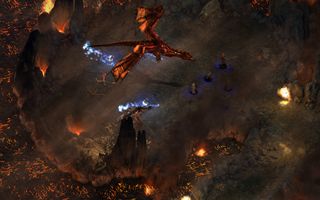
Kurvitz’s solution? Broaden everything. Settings, mechanics, what an RPG means, even who creates them. Writers and artists from other industries with different expertise need to be tempted over, but he doesn’t see that happening until the love affair with high fantasy has ended.
“I’m going to sound elitist, but I’m going to suggest that a lot of really good writers don’t want to write in a high fantasy setting. They don’t want to spend four stressful years on Tolkien fanfic. You just won’t get really talented writers who can do tremendous things for your game that way, and you need to hire artists and writers outside of the usual development circuit.”
If we were to get away from the conventions of the CRPG, one of the best places to look would be tabletop RPGs. Again. Once you move beyond official D&D campaigns and all the expectations that come along with them, the tabletop landscape becomes a lot more unpredictable and experimental.
“People do these amazingly historically accurate D&D sessions of the Peninsular War,” says Kurvitz. “They order actual, real-life memorabilia and objects from the Peninsular War, and models, and play with them. I know that amazingly strange things are being done with tabletop, but CRPGs are really conservative in comparison.”
Sawyer’s designing a Pillars of Eternity tabletop game, which is proving to be liberating after working within the framework of a spiritual successor. “When Feargus Urquhart suggested a stretch goal that was a pen and paper starter guide, I said I’d do it as long as I’m able to do whatever I want. I’m not going to make the game to fit someone else’s criteria. I’m going to pick the mechanics that will make a great game. If it’s not like D&D, too bad, and if it is like D&D but you don’t like it, too bad.”
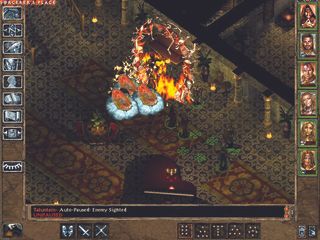
Tabletop roleplaying’s variety does introduce one obstacle, however, and it’s one that games have already dealt with. “There’s only one thing I hate about my board game weekends,” says Vincke. “Reading the rules.” The tropes and conventions of CRPGs give players a vocabulary and understanding of the genre that can be transferred to other games, letting them dive in without a manual. Shaking things up could threaten their accessibility.
Variety also means, however, that there can be RPGs that are easy to understand, dense and complicated sandboxes and adventures that do away with abilities and skills and gear. There are plenty of directions that the genre should be able to take, all at the same time.
“I think people are right that there’s a renaissance of traditional RPGs, or the traditional style of RPGs, but I don’t want us to squander this opportunity to really grow the genre into something broader,” says Sawyer. “We don’t need to abandon fantasy or crunchy number systems, but that doesn’t have to be the limit of what we make.”
What Kurvitz wants to see is a complete revolution, imagining RPGs that take decades or even a hundred years to make, flagging and reacting to every tiny thing you do. He envisions RPGs becoming a new mode of literature—programmed literature—putting programmers and novelists together to tell stories that literally span generations. It’s improbably ambitious and far-fetched, but still incredibly tantalising.
“I hope we’re going to get the ball rolling.”
![The Year of Incline [2014] Codex 2014](/forums/smiles/campaign_tags/campaign_incline2014.png)
Kurvitz sees a genre in stasis, and it’s the source of some frustration. “It’s very odd. RPGs are essentially reality simulators, and the hook is that the position the player is put into is the skin of one person. So it also simulates mental and physical faculties, giving not a bird’s eye view of reality but the subjective reality of one person. That seems in and of itself a tremendously open concept that should be constantly evolving.”
What Kurvitz wants to see is a complete revolution, imagining RPGs that take decades or even a hundred years to make, flagging and reacting to every tiny thing you do. He envisions RPGs becoming a new mode of literature—programmed literature—putting programmers and novelists together to tell stories that literally span generations. It’s improbably ambitious and far-fetched, but still incredibly tantalising.
“I hope we’re going to get the ball rolling.”


Indeed. Finally someone says it. Though in PnP space issue is older. I recall I participated few times in mini campaigns (could be played trough in one few hours sessions, so module per gaming session) that were set in 60's B film like settings and they felt really refreshing. I also heard one of the players in my group that he was also playing Paranoia in other group. I knew about the game but I never came to ask for invite, which I still see as missed opportunity. Some other titles from the 80's, say Car Wars and Shadowrun they were created because there was demand for that sort of games. In cRPG space I think that's something people at Black Isle (Fallout) understood in a way or another.Robert Kurvitz, lead designer
“The RPGs we play nowadays are based on massive revolutions. The first Fallout was, I think, the last major change to RPGs. It changed the setting and showed you could do completely different things from its high fantasy roots. I was 11 when I played that, but I’ve never seen anything as revolutionary in all my years playing since.”
Kurvitz sees a genre in stasis, and it’s the source of some frustration. “It’s very odd. RPGs are essentially reality simulators, and the hook is that the position the player is put into is the skin of one person. So it also simulates mental and physical faculties, giving not a bird’s eye view of reality but the subjective reality of one person. That seems in and of itself a tremendously open concept that should be constantly evolving.”
The source of this stagnation goes far beyond RPGs or even video games, he says. Kurvitz believes that it’s the product of culture, particularly pop culture, slowing down. “It’s calcifying. The internal generation engine of western pop culture is just very self-referential in general. So that could be one possible reason for it—just people growing old.”
Indeed, I don't think either that traditional fantasy games need to die, but there has to be room for other things, say science fantasy -> space opera, or detective - > cyberpunk, but there really are a lot of possibilities very few appear to be pursuing.Kurvitz’s solution? Broaden everything. Settings, mechanics, what an RPG means, even who creates them. Writers and artists from other industries with different expertise need to be tempted over, but he doesn’t see that happening until the love affair with high fantasy has ended.
“I’m going to sound elitist, but I’m going to suggest that a lot of really good writers don’t want to write in a high fantasy setting. They don’t want to spend four stressful years on Tolkien fanfic. You just won’t get really talented writers who can do tremendous things for your game that way, and you need to hire artists and writers outside of the usual development circuit.”




Finally someone says it.
Well, I meant developers but every little helps.Finally someone says it.
I keep saying this for whole last year, but yeah, i'm not Kurvitz, that's for sure...
Urban fantasy is interesting possibility because a lot of things could be done with it. I think of Shadowrun (pnp) and can think it like future-cyberpunk-urban fantasy. I don't know if game actually predates term 'urban fantasy'.Urban fantasy is what we need.
Vincke is all about money-making

Devs sure love their fantasy, be it regular, urban or whatever. How about just a realistic war RPG like JA or Silent Storm?
Devs sure love their fantasy, be it regular, urban or whatever. How about just a realistic war RPG like JA or Silent Storm?
Alpha Protocol bombed.

Cos of production quality-bad gameplay.
But i said realistic, not fantasy.Devs sure love their fantasy, be it regular, urban or whatever. How about just a realistic war RPG like JA or Silent Storm?
Alpha Protocol bombed.

Cos of production quality-bad gameplay.
Would one say Alpha Protocol really looks and plays significantly worse than Mass Effect or Fallout 3?
What Kurvitz wants to see is a complete revolution, imagining RPGs that take decades or even a hundred years to make, flagging and reacting to every tiny thing you do. He envisions RPGs becoming a new mode of literature—programmed literature—putting programmers and novelists together to tell stories that literally span generations. It’s improbably ambitious and far-fetched, but still incredibly tantalising.
How about just a realistic war RPG like JA or Silent Storm?

So you're saying Obsidian should have focused less on reactivity and more on making a Metal Gear Solid clone.Mass Effect(1?) and Fallout 3 came out couple years before AP and they have more things going for them; they sold on scope.

So you're saying Obsidian should have focused less on reactivity and more on making a Metal Gear Solid clone.Mass Effect(1?) and Fallout 3 came out couple years before AP and they have more things going for them; they sold on scope.

Sven's legitimate passion for what he does is obvious in every interview and Kickstarter video I've seen. The history of Larian on the Divinity 2 Director's cut is a great watch too
Mass Effect(1?) and Fallout 3 came out couple years before AP and they have more things going for them; they sold on scope. Its why Bethesda constantly gets away with bad gameplay, ıf they make an RPG in a realistic setting with the same formula, it would be received just as well.







